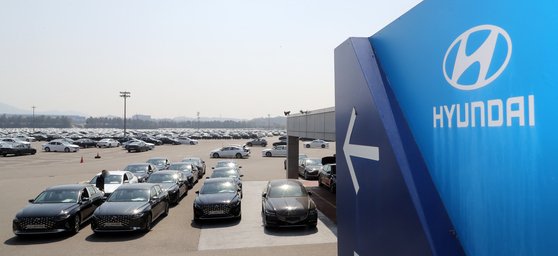![Finished cars line up at the Hyundai Motor's Asan, South Chungcheong factory in 2021. [NEWS1]](https://koreajoongangdaily.joins.com/data/photo/2024/03/05/db50714c-c378-49bc-81ec-e2473e1c7516.jpg)
Completed automobiles line up on the Hyundai Motor’s Asan, South Chungcheong manufacturing unit in 2021. [NEWS1]
Youthful adults are buying fewer automobiles in Korea, whereas older adults are buying extra, in keeping with new knowledge compiled by the Korea Car & Mobility Affiliation.
Folks of their 60s accounted for 11.4 % of latest automobile homeowners in 2023, a major improve from their share of 8.8 % in 2019.
A complete of 169,655 individuals over 60 registered a automobile that yr, an uptick from the 131,176 who did so in 2019.
It was the primary yr that the age group surpassed a ten % share.
The proportion of latest automobile homeowners of their 20s and 30s, in flip, shrank. Patrons of their 20s fell from 7.1 % in 2019 to six.7 % in 2021 and 5.8 % in 2023.
These of their 30s confirmed an analogous regular lower — falling from 15.9 % in 2019 and 14.9 % in 2021 to 14.1 % in 2023 — regardless of being perceived as having extra steady earnings.
Some knowledge recommend that younger adults are refraining from buying automobiles on account of their funds.
The typical grownup youthful than 39 held belongings of 363 million received ($271,808) in 2022 in keeping with Statistics Korea, whereas these over 40 claimed a mean of 584 million received. The hole between the 2 teams is widening yearly.
Some consultants recommend that the current surge in automobile costs could also be attributed to the elevated costs of vehicle elements.
“The typical age of automobiles owned by shoppers is growing as a result of lower in inhabitants and the rise in automobile costs going by way of Covid-19,” mentioned Kim Pil-soo, a professor of automotive engineering at Daelim College Faculty.
The growing older inhabitants additionally presents challenges for automobile-related corporations, as gross sales might decline as inhabitants decreases.
Driving colleges are closing, for instance, as there are fewer individuals trying to get a driver’s license.
There have been simply 960,000 newly licensed drivers in 2022 in keeping with the Nationwide Police Company, in comparison with 1.08 million in 2017.
“The millennial era, these born from 1980 to 2000, tends to share automobiles fairly than to purchase one themselves,” Hyundai Motor Group Government Chair Euisun Chung mentioned throughout a gathering in 2019. “My son doesn’t even consider getting a driver’s license.”
Automotive manufacturing corporations are dashing to promote automobiles to younger shoppers, leveraging each worth and design, from the preliminary levels of product growth.
The outer inside of the Genesis GV80 Coupe, launched from Hyundai Motor’s model Genesis final yr, was redesigned to enchantment to shoppers of their 30s and 40s.
“The planning course of for the coupe mannequin aimed to draw youthful consumers from the outset,” a model insider mentioned. “The typical age of the particular consumers of the mannequin is 5 to seven years youthful in comparison with the unique merchandise beforehand launched from the model.”
This may increasingly additionally clarify why automobile manufacturing corporations are constantly launching crossover utility automobiles (CUVs), that are widespread amongst younger shoppers. A CUV sits between a sedan and an SUV, providing the vast inside and look at of the latter at a lighter weight.
Kia’s EV3, set to launch this yr, is one other product designed to appeal to youthful adults with a relatively inexpensive price ticket.
The Hyundai Motor Group’s heavy investments in its high-performance N model additionally catered to the demographic.
“Certainly one of N model’s targets is to supply an thrilling driving expertise to those that are usually not all in favour of driving,” a supply from Hyundai Motor’s N model division mentioned.
Hyundai Motor and Kia have additionally operated subscription platforms referred to as “Hyundai Choice” and “KIA Flex,” respectively, since 2019, concentrating on the younger adults of their 20s and 30s.
BY KANG KI-HEON [kim.jiye@joongang.co.kr]
Supply
https://koreajoongangdaily.joins.com/information/2024-03-05/enterprise/trade/Koreas-young-people-arent-buying-cars-anymore/1995254



